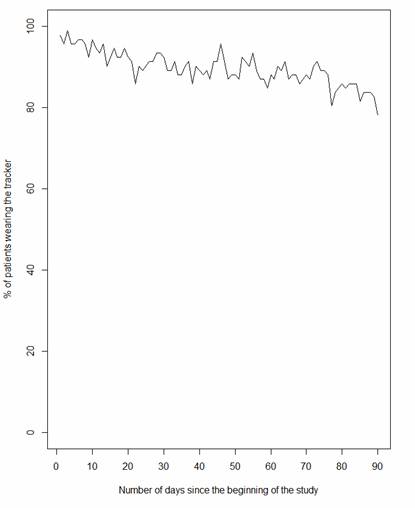Session Information
Session Type: ACR Poster Session B
Session Time: 9:00AM-11:00AM
Background/Purpose: Physical activity is recommended and is an important part of the management of inflammatory arthritis and in particular RA and axSpA. Activity trackers, and in particular connected devices, are more and more used to assess physical activity and motivate people to increase their activity level in the general population, and in chronic conditions. However there may be technical issues for arthritic patients and a rapid loss of motivation. The objective of this study was to assess the acceptability of a physical activity connected device in RA/AxSpA patients.
Methods: In this prospective multicenter observational study patients had definite axSpA (ASAS criteria) or RA (ACR/EULAR criteria), and owned a smartphone. All patients were provided with an activity tracker (a watch) connected by Bluetooth and were instructed to wear it every day for 3 months. Acceptability was assessed by the mean number of days the tracker was worn over the 3 months (ie adherence). We considered that the tracker was worn a day if at least 8 hours of physical activity were recorded between the first and the last step. Then predictors of adherence were explored by comparing in univariate and multivariate analyses the adherent patients (ie bracelet worn at least 80/90 days) to non-adherent patients. Acceptability to the use of the activity tracker were assessed by a questionnaire.
Results: 92 patients (49 RA and 43 axSpA patients) were included: 39 (42.4%) were males, with a mean age of 46.6 (±12.3) and a mean disease duration of 10.8 (±7.8) years; 52 (56.5%) were receiving a biologic. RA and axSpA patients had respectively a mean DAS 28 of 2.2 (±1.0) and a mean BASDAI of 3.4 (±2.1). Patients wore the activity trackers 91.3% of the time, during 80.7 (±13.5) days on average and 64 (69.6%) patients wore it at least 80/90 days; 81 (88.0%) patients still wore the device at the end of the 3-month period (Figure). Adherent patients were more often men (OR=7.69, p<0.01), had more often RA (OR=5.56, p=0.02) and were more likely to be treated with biologics (OR=5.00, p<0.01). Overall 69 (75%) patients reported no technical issues related to the use of the device though 17 (18%) needed helped to set the device; 2 (2.2%) patients reported issues to wear the device because of their arthritis. The acceptability of the activity tracker was scored on average at 9 on a 0 to 10 scale.
Conclusion: Acceptability of a connected device in RA and axSpA is high in a population of selected patients accepting to participate in this 3 months study. Studies using connected devices in rheumatology are feasible, but long-term assessments are needed.
Figure: Proportion of patients wearing the tracker throughout the study
 |
To cite this abstract in AMA style:
Jacquemin C, Servy H, Molto A, Sellam J, Foltz V, Gandjbakhch F, Hudry C, Mitrovic S, Fautrel B, Gossec L. Acceptability of a Connected Activity Tracker in 92 Patients with Rheumatoid Arthritis (RA) or Axial Spondyloarthritis (axSpA): A 3-Months Study [abstract]. Arthritis Rheumatol. 2016; 68 (suppl 10). https://acrabstracts.org/abstract/acceptability-of-a-connected-activity-tracker-in-92-patients-with-rheumatoid-arthritis-ra-or-axial-spondyloarthritis-axspa-a-3-months-study/. Accessed .« Back to 2016 ACR/ARHP Annual Meeting
ACR Meeting Abstracts - https://acrabstracts.org/abstract/acceptability-of-a-connected-activity-tracker-in-92-patients-with-rheumatoid-arthritis-ra-or-axial-spondyloarthritis-axspa-a-3-months-study/
